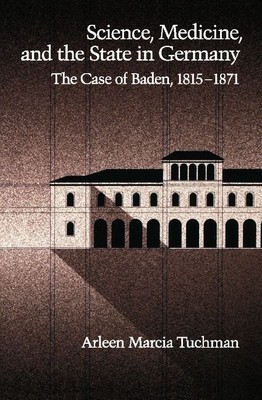
- We will send in 10–14 business days.
- Author: Arleen Marcia Tuchman
- Publisher: Oxford University Press, USA
- ISBN-10: 0195080475
- ISBN-13: 9780195080476
- Format: 15.4 x 24.2 x 2 cm, hardcover
- Language: English
- SAVE -10% with code: EXTRA
Science, Medicine, and the State in Germany (e-book) (used book) | bookbook.eu
Reviews
Description
This superb account of the development of scientific research in the state of Baden places the growth of science in nineteenth century Germany within a broad social and economic context. The book analyses the progress of scientific research and its institutionalization in the state university system. Focusing on the experimental sciences, the book explores the introduction of the research ethic into the university medical curriculum, and the process by which laboratory science came to be an essential pedagogical tool in the education of future citizens of the state. The social and economic changes that ultimately transformed Germany into a modern industrial state are also considered. It was within this setting that laboratory training, once considered inappropriate for university studies, grew in status, and that dissatisfaction with the overly theoretical education traditionally offered by the universities began to increase. Thus, much like computers today, the scientific method
in the nineteenth century came to represent an instrument for teaching not only specific skills but also a particular way of approaching, analyzing, and solving the problems of an industrializing economy. This compelling volume will be of interest to historians of science, medicine, and European studies.
EXTRA 10 % discount with code: EXTRA
The promotion ends in 17d.03:11:42
The discount code is valid when purchasing from 10 €. Discounts do not stack.
- Author: Arleen Marcia Tuchman
- Publisher: Oxford University Press, USA
- ISBN-10: 0195080475
- ISBN-13: 9780195080476
- Format: 15.4 x 24.2 x 2 cm, hardcover
- Language: English English
This superb account of the development of scientific research in the state of Baden places the growth of science in nineteenth century Germany within a broad social and economic context. The book analyses the progress of scientific research and its institutionalization in the state university system. Focusing on the experimental sciences, the book explores the introduction of the research ethic into the university medical curriculum, and the process by which laboratory science came to be an essential pedagogical tool in the education of future citizens of the state. The social and economic changes that ultimately transformed Germany into a modern industrial state are also considered. It was within this setting that laboratory training, once considered inappropriate for university studies, grew in status, and that dissatisfaction with the overly theoretical education traditionally offered by the universities began to increase. Thus, much like computers today, the scientific method
in the nineteenth century came to represent an instrument for teaching not only specific skills but also a particular way of approaching, analyzing, and solving the problems of an industrializing economy. This compelling volume will be of interest to historians of science, medicine, and European studies.


Reviews